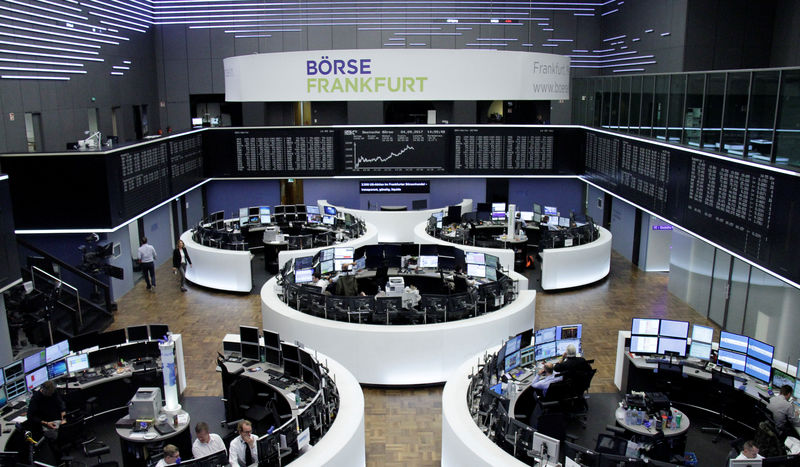By Marc Jones
LONDON (Reuters) - The euro and world stocks inched higher on Thursday, as markets waited for clues on just how close the European Central Bank is to scaling back its more than 2 trillion euro ($2.75 trillion) stimulus program.
Traders were left waiting for Mario Draghi's 1230 GMT news conference after the ECB's initial post-meeting statement reaffirmed its ultra-easy policy stance and even kept the door open to increasing its bond purchases if needed.
The euro
Markets also benefited from relief that the U.S. Congress struck a deal on the country's debt limit and that there had been no further ratcheting up of the North Korea crisis in Asia.
Most European markets had managed to shake off what had been a sluggish start to leave the pan-regional Stoxx 600 index up 0.4 percent. (EUA) A fifth day of gains in auto stocks helped German shares outperform. (Graphic: ECB's asset purchase program - http://reut.rs/2vNqFJa)
President Mario Draghi is expected to lay the groundwork for winding down the ECB's 60 billion-euro-a-month asset purchase program, though few investors expect to see a clear framework just yet. (Graphic: Hurricanes in the Caribbean - http://reut.rs/2gMhjXe)
"Most people are on the same page that the ECB will do something to reduce their accommodation (soon)," said JP Morgan Asset Management Strategist Nandini Ramakrishnan.
"We don't expect them to announce the start of tapering this meeting, but we do expect them to give us an idea they will start in January. The details are more likely to come at the October meeting," she said.
Canada’s dollar <CAD=D4> held its gains, after a surprise interest rate rise on Wednesday reminded everyone that G7 monetary settings will not remain super-easy forever .
It also showed the clear implication of policy tightening right now - the Canadian dollar surged more than 2 percent at one point to its highest levels in two years. (Graphic: World FX rates in 2017 - http://tmsnrt.rs/2egbfVh)
Analysts say that is the ECB’s main conundrum. All the economic activity signals suggest it should take its foot off the gas - updated Eurostat figures as policymakers met confirmed the bloc saw robust growth in the second quarter.
But the 13 percent surge of the euro already this year is playing havoc with its sub-target inflation outlook, and it will want to step lightly for fear of compounding the problem with another exchange rate jump.
That is not the only issue Frankfurt is struggling with.
Sweden's crown - the only northern European currency to have risen against the euro this year - fell on Thursday after its central bank said it was introducing a bigger buffer on its inflation target. That should give it more leeway on policy moves.
AT THE LIMIT
Wall Street futures pointed to a subdued restart for New York markets later (N), though Asian markets had been mildly risk-on overnight.
China's yuan rose past the psychologically important 6.5 per dollar level for the first time since May 2016, MSCI's broadest index of Asia-Pacific shares (MIAPJ0000PUS) gained 0.3 percent and Japan's Nikkei (N225) rose 0.2 percent.
South Korea's KOSPI (KS11), which has been burdened by tensions over North Korea, jumped 1.2 percent. That was its biggest gain in four months and came amid signs that major powers were talking intensively about the region's strains.
South Korean President Moon Jae-in said he was having discussions with the leaders of Russia, Japan and the United States and that there would be no war on the peninsula.
China said it agreed the United Nations should take more action against North Korea after its latest nuclear test. North Korea said any U.N. sanctions would be met with "powerful counter measures" as it again accused the U.S. of angling for war.
Market sentiment had also been helped after U.S. President Donald Trump forged a surprising deal with Democrats in Congress to raise the U.S. debt limit and provide government funding until Dec. 15.
There was some disappointment that the deal was so short-term. But U.S. economic data was also fairly upbeat.
"The deadline on the debt ceiling has been extended just by three months, so it will come back to haunt markets again later this year. Still, markets liked it as we don't have to worry about it for now," said Masahiro Ichikawa, senior strategist at Sumitomo Mitsui Asset Management.
Yields on U.S. Treasuries had ticked higher on the deal but were being pushed back again, along with the dollar in Europe., Ten-year paper was hovering at 2.087 (US10YT=RR) just off the previous days 10-month low of 2.054 percent.
In commodities, oil prices maintained most of this week's strong gains as the reopening of U.S. Gulf Coast refineries improved the outlook after sharp falls caused by Hurricane Harvey. [O/R]
U.S. crude futures (CLc1) were steady at $49.05 per barrel, having gained 3.0 percent in the previous three sessions, while Brent (LCOc1) ticked to a new 3-1/2-month high of $54.59.
Traders are now shifting their focus to Hurricane Irma, ranked as one of the five most powerful Atlantic hurricanes in the last 80 years. It killed eight people on the Caribbean island of Saint Martin, left Barbuda devastated on Thursday and was expected to reach Florida at the weekend .

($1 = 0.8378 euros)